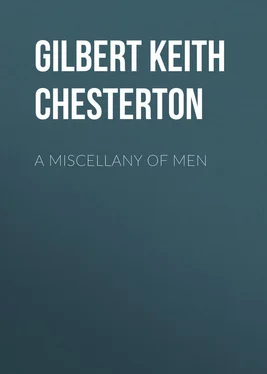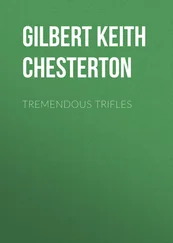Gilbert Chesterton - A Miscellany of Men
Здесь есть возможность читать онлайн «Gilbert Chesterton - A Miscellany of Men» — ознакомительный отрывок электронной книги совершенно бесплатно, а после прочтения отрывка купить полную версию. В некоторых случаях можно слушать аудио, скачать через торрент в формате fb2 и присутствует краткое содержание. Жанр: foreign_antique, foreign_prose, на английском языке. Описание произведения, (предисловие) а так же отзывы посетителей доступны на портале библиотеки ЛибКат.
- Название:A Miscellany of Men
- Автор:
- Жанр:
- Год:неизвестен
- ISBN:нет данных
- Рейтинг книги:4 / 5. Голосов: 1
-
Избранное:Добавить в избранное
- Отзывы:
-
Ваша оценка:
- 80
- 1
- 2
- 3
- 4
- 5
A Miscellany of Men: краткое содержание, описание и аннотация
Предлагаем к чтению аннотацию, описание, краткое содержание или предисловие (зависит от того, что написал сам автор книги «A Miscellany of Men»). Если вы не нашли необходимую информацию о книге — напишите в комментариях, мы постараемся отыскать её.
A Miscellany of Men — читать онлайн ознакомительный отрывок
Ниже представлен текст книги, разбитый по страницам. Система сохранения места последней прочитанной страницы, позволяет с удобством читать онлайн бесплатно книгу «A Miscellany of Men», без необходимости каждый раз заново искать на чём Вы остановились. Поставьте закладку, и сможете в любой момент перейти на страницу, на которой закончили чтение.
Интервал:
Закладка:
And all the time I was thinking what a shame it was that he was not sticking his spade into his own garden, instead of mine: he knew about the earth and the underworld of seeds, the resurrection of Spring and the flowers that appear in order like a procession marshalled by a herald. He possessed the garden intellectually and spiritually, while I only possessed it politically. I know more about flowers than coal-owners know about coal; for at least I pay them honour when they are brought above the surface of the earth. I know more about gardens than railway shareholders seem to know about railways: for at least I know that it needs a man to make a garden; a man whose name is Adam. But as I walked on that grass my ignorance overwhelmed me – and yet that phrase is false, because it suggests something like a storm from the sky above. It is truer to say that my ignorance exploded underneath me, like a mine dug long before; and indeed it was dug before the beginning of the ages. Green bombs of bulbs and seeds were bursting underneath me everywhere; and, so far as my knowledge went, they had been laid by a conspirator. I trod quite uneasily on this uprush of the earth; the Spring is always only a fruitful earthquake. With the land all alive under me I began to wonder more and more why this man, who had made the garden, did not own the garden. If I stuck a spade into the ground, I should be astonished at what I found there…and just as I thought this I saw that the gardener was astonished too.
Just as I was wondering why the man who used the spade did not profit by the spade, he brought me something he had found actually in my soil. It was a thin worn gold piece of the Georges, of the sort which are called, I believe, Spade Guineas. Anyhow, a piece of gold.
If you do not see the parable as I saw it just then, I doubt if I can explain it just now. He could make a hundred other round yellow fruits: and this flat yellow one is the only sort that I can make. How it came there I have not a notion – unless Edmund Burke dropped it in his hurry to get back to Butler’s Court. But there it was: this is a cold recital of facts. There may be a whole pirate’s treasure lying under the earth there, for all I know or care; for there is no interest in a treasure without a Treasure Island to sail to. If there is a treasure it will never be found, for I am not interested in wealth beyond the dreams of avarice since I know that avarice has no dreams, but only insomnia. And, for the other party, my gardener would never consent to dig up the garden.
Nevertheless, I was overwhelmed with intellectual emotions when I saw that answer to my question; the question of why the garden did not belong to the gardener. No better epigram could be put in reply than simply putting the Spade Guinea beside the Spade. This was the only underground seed that I could understand. Only by having a little more of that dull, battered yellow substance could I manage to be idle while he was active. I am not altogether idle myself; but the fact remains that the power is in the thin slip of metal we call the Spade Guinea, not in the strong square and curve of metal which we call the Spade. And then I suddenly remembered that as I had found gold on my ground by accident, so richer men in the north and west counties had found coal in their ground, also by accident.
I told the gardener that as he had found the thing he ought to keep it, but that if he cared to sell it to me it could be valued properly, and then sold. He said at first, with characteristic independence, that he would like to keep it. He said it would make a brooch for his wife. But a little later he brought it back to me without explanation. I could not get a ray of light on the reason of his refusal; but he looked lowering and unhappy. Had he some mystical instinct that it is just such accidental and irrational wealth that is the doom of all peasantries? Perhaps he dimly felt that the boy’s pirate tales are true; and that buried treasure is a thing for robbers and not for producers. Perhaps he thought there was a curse on such capital: on the coal of the coal-owners, on the gold of the gold-seekers. Perhaps there is.
THE VOTER AND THE TWO VOICES
The real evil of our Party System is commonly stated wrong. It was stated wrong by Lord Rosebery, when he said that it prevented the best men from devoting themselves to politics, and that it encouraged a fanatical conflict. I doubt whether the best men ever would devote themselves to politics. The best men devote themselves to pigs and babies and things like that. And as for the fanatical conflict in party politics, I wish there was more of it. The real danger of the two parties with their two policies is that they unduly limit the outlook of the ordinary citizen. They make him barren instead of creative, because he is never allowed to do anything except prefer one existing policy to another. We have not got real Democracy when the decision depends upon the people. We shall have real Democracy when the problem depends upon the people. The ordinary man will decide not only how he will vote, but what he is going to vote about.
It is this which involves some weakness in many current aspirations towards the extension of the suffrage; I mean that, apart from all questions of abstract justice, it is not the smallness or largeness of the suffrage that is at present the difficulty of Democracy. It is not the quantity of voters, but the quality of the thing they are voting about. A certain alternative is put before them by the powerful houses and the highest political class. Two roads are opened to them; but they must go down one or the other. They cannot have what they choose, but only which they choose. To follow the process in practice we may put it thus. The Suffragettes – if one may judge by their frequent ringing of his bell – want to do something to Mr. Asquith. I have no notion what it is. Let us say (for the sake of argument) that they want to paint him green. We will suppose that it is entirely for that simple purpose that they are always seeking to have private interviews with him; it seems as profitable as any other end that I can imagine to such an interview. Now, it is possible that the Government of the day might go in for a positive policy of painting Mr. Asquith green; might give that reform a prominent place in their programme. Then the party in opposition would adopt another policy, not a policy of leaving Mr. Asquith alone (which would be considered dangerously revolutionary), but some alternative course of action, as, for instance, painting him red. Then both sides would fling themselves on the people, they would both cry that the appeal was now to the Caesar of Democracy. A dark and dramatic air of conflict and real crisis would arise on both sides; arrows of satire would fly and swords of eloquence flame. The Greens would say that Socialists and free lovers might well want to paint Mr. Asquith red; they wanted to paint the whole town red. Socialists would indignantly reply that Socialism was the reverse of disorder, and that they only wanted to paint Mr. Asquith red so that he might resemble the red pillar-boxes which typified State control. The Greens would passionately deny the charge so often brought against them by the Reds; they would deny that they wished Mr. Asquith green in order that he might be invisible on the green benches of the Commons, as certain terrified animals take the colour of their environment.
There would be fights in the street perhaps, and abundance of ribbons, flags, and badges, of the two colours. One crowd would sing, “Keep the Red Flag Flying,” and the other, “The Wearing of the Green.” But when the last effort had been made and the last moment come, when two crowds were waiting in the dark outside the public building to hear the declaration of the poll, then both sides alike would say that it was now for democracy to do exactly what it chose. England herself, lifting her head in awful loneliness and liberty, must speak and pronounce judgment. Yet this might not be exactly true. England herself, lifting her head in awful loneliness and liberty, might really wish Mr. Asquith to be pale blue. The democracy of England in the abstract, if it had been allowed to make up a policy for itself, might have desired him to be black with pink spots. It might even have liked him as he is now. But a huge apparatus of wealth, power, and printed matter has made it practically impossible for them to bring home these other proposals, even if they would really prefer them. No candidates will stand in the spotted interest; for candidates commonly have to produce money either from their own pockets or the party’s; and in such circles spots are not worn. No man in the social position of a Cabinet Minister, perhaps, will commit himself to the pale-blue theory of Mr. Asquith; therefore it cannot be a Government measure, therefore it cannot pass.
Читать дальшеИнтервал:
Закладка:
Похожие книги на «A Miscellany of Men»
Представляем Вашему вниманию похожие книги на «A Miscellany of Men» списком для выбора. Мы отобрали схожую по названию и смыслу литературу в надежде предоставить читателям больше вариантов отыскать новые, интересные, ещё непрочитанные произведения.
Обсуждение, отзывы о книге «A Miscellany of Men» и просто собственные мнения читателей. Оставьте ваши комментарии, напишите, что Вы думаете о произведении, его смысле или главных героях. Укажите что конкретно понравилось, а что нет, и почему Вы так считаете.








